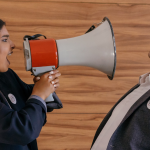
We’ve noticed an increase in divisive, hateful and just plain nasty online commentary over the past 12 months. Perhaps we’ve spent too much time online (definitely) as pandemic 2.0 brought out the worst in everyone, but in 2021 it sure seemed like the trolls were out in force. Ironically, the actual trolls weren’t the same people that public figures and politicians were calling trolls. Frustrating. To clear up misconceptions and arm you with the best strategies to fight back in 2022, here’s what the research and experts say on why people troll, who they are, and how to stop them.
What classifies as trolling?
With certain public figures keen to label any criticism ‘trolling’ it’s important to get really specific with what we’re talking about. Trolling is when people leave deliberately hateful, insulting or blatantly false comments on digital media platforms for the purpose or provoking a response.
Trolling also must have malicious intent alongside the desire to provoke a response. Online this is understood as “being in bad faith”. If someone posts a provocative or challenging opinion, but is genuinely trying to put across a point of view, level criticism, or engage others in real discussion, that wouldn’t classify as trolling because it’s been expressed “in good faith”. They intend to contribute or start a conversation. Troll comments don’t care about conversation – their purpose is to upset people or spread hate.
Typically, trolls have little or no connection to the users they are harassing. They are simply taking the opportunity to provoke and upset anyone without caring who it is, apart from broad generalisations (i.e: a woman, a lefty/right-wing nutjob, person with a disability, etc). Think of trolls like men who catcall women on the street – they’re opportunistically trying to upset any woman, it’s not specifically about you.
Trolling is not quite the same as cyberbullying, which tends to be targeted to a specific individual. Cyberbullies typically know or have some connection to the person they are harassing – more like a group of school kids bullying one of their peers.
It’s a common misconception that people only troll from anonymous accounts. Many social media users troll others from their real accounts, using their real names or (unbelievably) even their business accounts. Of course, some people do create unidentifiable accounts specifically to use for trolling – real weirdo behaviour.
Why do people troll on social media?
This is the big question: WHY? Why do they do this? The answer is alarmingly simple. Multiple studies have shown that people who engage in trolling are more likely to have sadistic and psychopathic traits. In layman’s terms, that means they enjoy inflicting pain and suffering on others (sadism) and that they lack empathy (psychopathy). They do it because they enjoy it and it entertains them.
Trolls actually do have strengths in a specific type of empathy: cognitive empathy, the ability to identify and understand emotions in others. Trolls do have cognitive empathy, which means they know when someone is in pain and what causes pain. They use the knowledge of what will hurt to inform their comments. The kind of empathy they lack is affective empathy, which is when we share and feel the emotional pain of others.
Interestingly, further research showed trolling behaviour is not correlated to low self-esteem. The popular idea that trolls hurt others ‘to make themselves feel better’ could be a myth. In fact, the study found the opposite to be true – someone with high self-esteem and markers of sadism is even more likely to be a troll.
Other wonderful traits that trolls are more likely to exhibit: narcissism, manipulativeness, and motivation by negative social reward (creating division and mayhem, where most people seek positive social reward like connection and harmony.) You might even go so far as saying that offline trolls are those who intentionally create societal division for their own enjoyment and personal gain. Think Piers Morgan, Alan Jones, Andrew Bolt, Barclay McGain, and even Donald Trump.
For what it’s worth, trolls are more often men. Ginger Gorman, who authored the book Troll Hunting, wrote for the ABC that trolls are mostly “a cohort of angry, white men aged 18-35 [who] police discourse on the internet with themselves at the centre.”
To sum up: trolls be trolling because they enjoy causing pain in others, lack empathy, thrive on attention and have high-enough self-esteem to believe they can do it without any real consequences.
OMG 😂 Love the way @elonmusk trolls the elitist politicians. pic.twitter.com/S7xuQk8ZaS
— ⚡JENNerator ⚡ Fate ❤ Irony (@Jennerator211) December 14, 2021
What actually stops the trolls?
It’s boring, but the cliche “don’t feed the trolls” is kind of true. Because trolling is an intentional action specifically designed to trigger a response, the most effective strategy is to ignore troll comments. Don’t respond to trolling comments, but don’t leave them visible either – delete, block, restrict and report.
Although it’s tempting to ‘fight back’ with a sassy comment or call-out trolls publicly, they thrive off this attention – the controversial nature of their posts are a deliberate way to game the engagement-based algorithms of digital platforms. ‘Boosting’ troll comments just increases their reach, helping them piss off more people which is ultimately what they want. It might feel funny or satisfying in the moment, but replying or sharing troll content tends to attract more trolls.
Ignoring the trolls doesn’t mean you need to go quiet on your account. Continue to post, share and engage in the ways you normally would. Even better, Gorman found that rallying friends and followers to share your content creates a “bystander effect” where the positive support drowns out even targeted trolling campaigns. She explains that “[trolls] are also trying to silence you and if you leave they win.” It’s a way of “reclaiming the internet” with healthy discourse.
Will Scott Morrison’s ‘Anti-Trolling’ Bill work?
With all the above in mind, with the Coalition’s proposed and so-called ‘Anti-Trolling’ Bill work? Absolutely not… because it’s not actually about trolling at all.
Morrison and the Coalition have given this Bill a misleading name (you can read the whole draft here). The purpose of the legislation is to address the harm of defamatory comments on social media and correct the legal outcome of the Dylan Voller High Court decision.
Trolling does not equal defamation. In fact, we imagine the vast majority of troll comments would not be defamatory – so the laws wouldn’t cover them.
The laws do require social media providers (i.e. Meta, Google, ByteDance) to reveal the so-called troll’s real name and contact details if requested for the purposes of ‘genuine’ defamation proceedings. But again, this is in the context of being able to sue for defamation and not general online safety. Not only that, if a troll has used fake contact details to create their anonymous account, the legislation is useless anyway.
Australia already has a Government agency, the e-Safety Commissioner, that is responsible for helping people who are targeted by cyberbullying or ‘harmful online content’. But the nature of trolling makes it difficult for this body, or other legal instruments like the proposed defamation Bill, to squash.




Comments are closed.